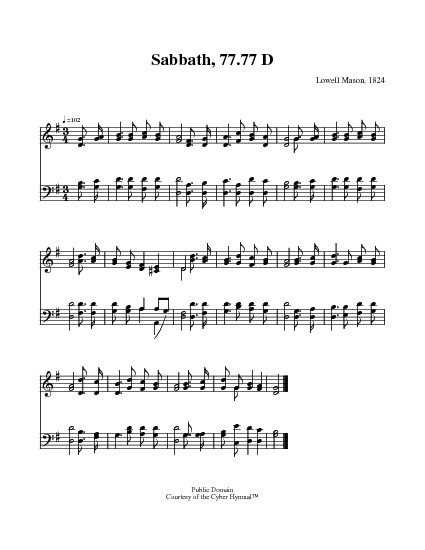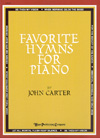- |
User Links
Safely Through Another Week

Safely through another week
Author: John Newton (1774)Tune: SABBATH (Mason)
Published in 1033 hymnals
Printable scores: PDF, MusicXMLAudio files: MIDI
Representative Text
1 Safely through another week
God has brought us on our way;
let us now a blessing seek,
waiting in His courts today;
day of all the week the best,
emblem of eternal rest.
2 While we pray for pard'ning grace,
through the dear Redeemer's name,
show Thy reconciling face;
take away our sin and shame;
from our worldly cares set free,
may we rest this day in Thee.
3 Here we come Thy name to praise,
let us feel Thy presence near;
may Thy glory meet our eyes,
while we in Thy house appear:
here afford us, Lord, a taste
of our everlasting feast.
4 May Thy gospel's joyful sound
conquer sinners, comfort saints;
may the fruits of grace abound,
bring relief for all complaints:
thus may all our Sabbaths prove,
till we join the church above.
Source: Psalms and Hymns to the Living God #180
Author: John Newton
 John Newton (b. London, England, 1725; d. London, 1807) was born into a Christian home, but his godly mother died when he was seven, and he joined his father at sea when he was eleven. His licentious and tumultuous sailing life included a flogging for attempted desertion from the Royal Navy and captivity by a slave trader in West Africa. After his escape he himself became the captain of a slave ship. Several factors contributed to Newton's conversion: a near-drowning in 1748, the piety of his friend Mary Catlett, (whom he married in 1750), and his reading of Thomas à Kempis' Imitation of Christ. In 1754 he gave up the slave trade and, in association with William Wilberforce, eventually became an ardent abolitionist. After becoming a tide… Go to person page >
John Newton (b. London, England, 1725; d. London, 1807) was born into a Christian home, but his godly mother died when he was seven, and he joined his father at sea when he was eleven. His licentious and tumultuous sailing life included a flogging for attempted desertion from the Royal Navy and captivity by a slave trader in West Africa. After his escape he himself became the captain of a slave ship. Several factors contributed to Newton's conversion: a near-drowning in 1748, the piety of his friend Mary Catlett, (whom he married in 1750), and his reading of Thomas à Kempis' Imitation of Christ. In 1754 he gave up the slave trade and, in association with William Wilberforce, eventually became an ardent abolitionist. After becoming a tide… Go to person page >Text Information
| First Line: | Safely through another week |
| Title: | Safely Through Another Week |
| Author: | John Newton (1774) |
| Meter: | 7.7.7.7.7.7 |
| Language: | English |
| Notes: | German translation: "Wiederum hat uns gnädlich"; Spanish translation: See "La semana yo pasó" by Juan N. De Los Santos |
| Copyright: | Public Domain |
English
- A Book of Worship for the Use of the Evangelical Lutheran Church ... of the Church of the Redeemer, Richmond, Virginia #d141
- A Chord #d95
- A Collection of Evergreen Hymns, for All the People. New ed. #d117
- A Collection of Hymns #376
- A Collection of Hymns and a Liturgy: for the use of Evangelical Lutheran Churches, to which are added prayers for families and individuals (New and Enl. Stereotype Ed.) #651
- A Collection of Hymns and Prayers, for Public and Private Worship #422
- A Collection of Hymns and Sacred Songs: suited to both private and public devotions, and especially adapted to the wants and uses of the brethren of the Old German Baptist Church #536
- A Collection of Hymns for Public, Social and Domestic Worship #d712
- A Collection of Hymns for Public, Social, and Domestic Worship #315
- A Collection of Hymns for Public, Social, and Domestic Worship #d712 10 shown out of 649
German
Notes
Safely through another week. I. Newton. [Saturday Evening.] Appeared in R. Conyers's Psalms & Hymns, 1774, No. 355, in 5 stanzas of 6 lines: and again in the Olney Hymn, 1779, Bk. ii., No. 40. It is found in a few modern collections; and sometimes in an abbreviated and altered form, as in Kennedy, 1863, &c.
--John Julian, Dictionary of Hymnology (1907)
Access an additional article on the Canterbury Dictionary of Hymnology:


 My Starred Hymns
My Starred Hymns





